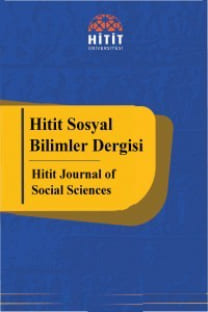PAVLUS’DA GNOSTİK İNSAN AYRIMCILIĞI : RUHSAL ULUSLAR KARŞISINDAKİ BEDENSEL İSRAİLLİLER
Pavlus tanrının İncil’ini iki farklı tarzda vazetmektedir: ilk olarak Davut’un bedensel olarak tohumundan var olmuş İsraillilere mesajı duyurmakta, ikincisi ise ruha göre tanrının oğlu olarak seçilmiş ve tasarlanmış kimselere aktarmıştır. İlk olarak yaratıcı olarak Yahve ile bağlantı kurmayı, daha sonra kurtarıcının insan nesline yönelmektedir. Davut uygun bir benzetmeyle Demiurge’nin kendisini ifade etmektedir, birincisi tıpkı bilge ve vakur bir kralmış gibi yarattıklarına hâkim olmakta, ve ikincisi bir Demiurge olarak bedene göre bütün insanları biçimlendirmekte ve hepsinin babası olmaktadır. Pavlus, yine üstü kapalı olarak, kurtarıcının iblis ruhlu bedensellere söylediği vaazın, Demiurge’nin (Davut’un) oğlu olarak bedene göre olmasına rağmen; İsa’nın ruhsallara duyurusunun ise, tanrının ya da babanın tasarladığı oğul olarak ruha göre olduğunu karakterize etmiştir. Hıristiyanların çoğu ya da çağrılmışlar bedensellerden gelmekte, görünmeyen tanrının bir görünümü olarak gözle görünen kâinata göre algıladıkları imanla ümit etmekte, kendisini yaratıcı ya da yüce güç olarak tanıtan Demiurge’ye tapmaktadırlar. Ruhsallar, Demiurgsal yasaya itaat etmekle yükümlü kılınmış bedensellerden çok daha iyi bir şekilde ruhun düsturlarına uymaktadır. Tanrının içteki gizli yasası; yazıyla kâğıt üzerine de yazılmaz, kutsal metinleri de oluşturmaz, sadece ruhsalları kalbine yazılır. Bedenseller, kutsal kelimeleri Demiurge’den kaptıkları için, bunları sadece kelime anlamıyla anlarlar. Pavlus, ruhsalların inancıyla yasayı ve kutsal metinleri imanlarıyla ortadan kaldıracağı sonucuna varmaktadır. Yasa seçilmişler tarafından geçersiz kılınacağı için, bedensel ibadet olarak sünnetin sunacağı kurtuluş ayrıcalığıyla bile olsa bedenselleri seçilmişler arasına katmayacaktır.
Anahtar Kelimeler:
Petrus, Yahudi Hıristiyanlığı, Göksel Kudüs, Bedensel Yasa, Ruhsal Elçi
-
Pavlus preaches the gospel of god in two different forms: first he proclaims the Israelian who descended from David in the flesh, second the one elected and designated son of God according to spirit. He first verges to contact to Yahweh as the creator and second verges to the savior's human lineage. Pavlus is speaking symbolically. David signifies the demiurge himself as an appropriate metaphor, first in that he masters the things he created like any vise and dignified king, and second as demiurge he has formed and fathered the mankind in the flesh. Pavlus characterizes still implicitly the psychic preaching of the savior according to the flesh as son of the demiurge (David) but the pneumatic proclamation of Christ according to the spirit as one designated son of god or the father. The majority of christians or called who are come from the flesh who sight in faith perceive as the visible cosmos an image of the invisible God, worship to the demiurge who advertised himself the creator or high power. The pneumatics who keep precepts of the spirit far better than psychics who are bound to obey the demiurgic law. The inner, the law of God, is written only on pneumatic's heart, not literal written and not consist to secret texts. So the psychics who received sacred words from the demiurge themselves understood them only literally. Pavlus concludes that the pneumatics abolish the law through the faith. The law is abolished by to the elect, the advantage of circumcision is that it offers the possibility of salvation to those psychics who are not included among the elect
Keywords:
Peter, Jewish Christianity, Heavenly Holy Land, Fleshly Law, Spiritual Prophet,
___
- Bauer W. (1971). Orthodoxy and Heresy in Earliest Christianity, Philadelphia
- Bornkamn G. (1973). Pavlus, Harper & Row, New York
- Brock D.L. (2008). Kayıp İnciller, Haberci, İstanbul
- Bultmann R. (1959). Theology of the New Testament, Scribner, New York
- Burkitt F.C. (1963). Church and Gnosis, Cambridge University Press, Cambridge
- Churton T. (1987). The Gnostics, London
- Couchoud P.L. (1939). The Creation of Crist, London
- Darrell L.B. (2008). Kayıp İnciller, İstanbul
- Eflatun, (1950). Cumhuriyet, İstanbul
- Freke T, Gandy P. (2005). İsa’nın Gizemleri, İstanbul
- Freke T. , Gandy P. (2006). İsa ve Kayıp Tanrıça, Ayna Yayınevi, İstanbul
- Floramo G. (2005). Gnostisizm tarihi, İstanbul
- Grant R.M. (1959). Gnosticism and early Christianity, New York
- Grobel K. The Goospel of Truth, Black, London
- Gündüz Ş. ( 1999). Sabiiler : Son Gnostikler, Ankara
- Gündüz Ş. (2011). Pavlus Hıristiyanlığın Mimarı, Ankara
- Gündüz Ş. (1998). Mitoloji ile İnanç Arasında, Samsun
- Gündüz Ş. (1997). “Gnostik Mitolojide Düşüş Motifi ve Demiurg Düşüncesi” Ondokuz Mayıs Üniversitesi İlahiyat Fakültesi Dergisi, 9. cilt
- Hançerlioğlu O. (1977). Felsefe Ansiklopedisi Kavram ve Akımlar, İstanbul
- Haris G.H. (1999). Gnosticism: beliefs and practices, Sussex
- Hoeller S.A. (2004). Bilinmeyen Jung: Carl G. Jung’un Gnostik ve Gizemli Dünyası, İzmir
- Jonas H. (2001). The gnostic religion: the message of the alien God and the beginnings of Christianity, New York
- Kasser R. (2006). The Gospel of Judas, London
- KMŞ (2004). Kutsal Kitap Eski ve Yeni Antlaşma (Tevrat, Zebur, İncil), İstanbul
- Kenneth H. (2010). Kayıp İncil’in Sırları, İstanbul
- KMŞ (2004). Kutsal Kitap Eski ve Yeni Antlaşma (Tevrat, Zebur, İncil), İstanbul
- Layton B. (1987). The Gnostic scriptures, New York
- Logan H.B. (1996). Gnostic truth and Christian heresy: a study in the history of gnosticism, New York
- Martin S. (2010). Gnostikler : İlk Hıristiyan Sapkınlar, İstanbul
- Mercan Ş. (2003). Gnostik İnciller : Binlerce Yıldır Vatikan’ın Yasakladığı İnciller, İstanbul
- Özemre Y.Ö. (2002). Toma’ya Göre İncil, Kaknüs, İstanbul
- Pearson B.A. (2007). Ancient Gnosticism: traditions and literature, London
- Platon, (1994). Yasalar (cilt 2), İstanbul
- Platon (1997). Timaios, İstanbul
- Platon, (2001). Phaidon, İstanbul
- Schmithals W. (1976). Gnosticism in Corinth, Abingdon, Nashville
- Schmithals W. (1972). Pavlus and The Gnostics, Abingdon, Nashville
- Schoeps H. (2010). Yahudi Hıristiyanlığı, İstanbul
- Schweitzer A. (1942)., The Mysticism of Pavlus : The Apostle, Harper & Brothers, New York
- Sean M. (2010). Gnostikler : İlk Hıristiyan Sapkınlar, İstanbul
- Smith A.P. Hoeller S.A. (2007). Gnostic Writings on the Soul, New York
- Yayın Aralığı: Yılda 2 Sayı
- Başlangıç: 2008
- Yayıncı: Hitit Üniversitesi
Sayıdaki Diğer Makaleler
PAVLUS’DA GNOSTİK İNSAN AYRIMCILIĞI : RUHSAL ULUSLAR KARŞISINDAKİ BEDENSEL İSRAİLLİLER
SÜRDÜRÜLEBİLİR DEMOKRATİK TOPLUMLAR İÇİN EĞİTİMİN KİLİT ROLÜ
Claudia LENZ, Claudia LENZ/(ÇEV.) MİNE GÖZÜBÜYÜK TAMER
EKONOMİK BÜYÜME, KALKINMA VE GELİR DAĞILIMI
POLİS, MEDYA ve HESAP VEREBİLİRLİK
